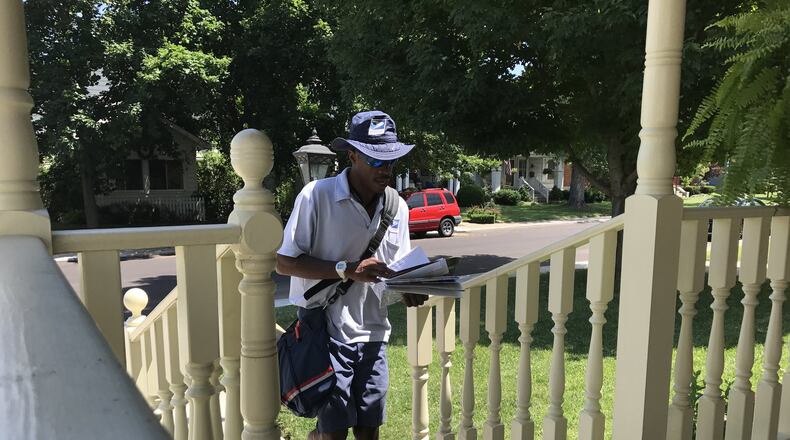While Elwell expects pop-up showers to persist from Tuesday through Friday, which will cool things down, he expects this week to be the “hottest of the year” thus far.
Monday’s 91-degree reading at 5 p.m. was the hottest since Aug. 11, 2016.
It had hit 88 degrees shortly after 1 p.m. Monday, and mailman Desean Johnson was about halfway through his 4.5-mile Kettering route. Sweat had collected just below his sunglasses, which were shaded by his U.S. Postal Service-issued bucket hat.
Johnson, in his sixth year as a mailman, isn’t just prepared for the heat — he embraces it.
“With me, if I think cool, I’ll be cool,” Johnson, who hits 562 houses between Carillon Park and the Dorothy Lane Walmart every day, said. “Every day is a different struggle out here in this heat, some days are better than others. But at the end of the day, rain, sleet or snow, the mail’s gotta go.”
Johnson had the option of driving an air-conditioned van, but chose to keep his old truck because he said air conditioning is “just a teaser” in his trade.
“We live in Dayton, so it can hail one second and the sun can come right back out,” Johnson said. “You never know.”
The Kettering Health Network issued a press release urging community members to take precaution against the “extreme heat.” Those most at risk are “the elderly and the very young,” the release says. Brian Nelson, executive director at The Carlyle House, an assisted living home in Kettering, agrees with the notion.
“They’re definitely in more of a fragile state, to where physically, they can’t take the demand of excessive heat,” Nelson said of his elderly residents. “If their body overheats, it takes them much longer to get to a normal state. They dehydrate very easily — that’s a concern year-round, but especially in the heat.”
Nelson says that his staff would restrict outdoor events, focus on keeping their residents hydrated, and consistently check their HVAC system during the heat.
At the South Dayton YMCA, Child Care Director Ashley Frazier tries to keep her 125 registered summer campers (ages 5-12) out of the sun as much as possible during scorching summer afternoons.
“When it does get this hot, with our camp program, we do try to keep our kids as cool as possible,” Frazier, in her seventh year as director, said. “That means we’re taking multiple breaks in the shade, we take a lot of water breaks when it gets this hot, and then we just try to incorporate games with water involved.”
When there’s a heat advisory, Frazier says that her 13 counselors will have the campers play games outside in the morning, bringing them in around noon to play inside the rest of the day.
The summer heat has also taken a toll on local adult recreation, as Kelly Pressel, golf division manager for the city of Dayton, says that the city’s courses typically see a decline in “casual play” during times of severe heat.
However, with the current heat wave coming during the week, Pressel believes that course attendance shouldn’t suffer extensively, as those who play in weekly leagues traditionally show up despite the weather.
So, who really benefits during a heat wave? The people who can make it cool, at least on the inside.
Butler Heating and Air Conditioning Company, located in Dayton, has seen a 35-40 percent increase in call volume over the past few days, according to owner Nick Lamb. The company has even received calls from other heating and air companies recently as well, asking that they run calls for them.
“Our techs are working around the clock, and all our lines are busy, pretty much all day,” Lamb said.
Butler installs new air conditioning units and repairs broken ones, while also performing optional maintenance on units. It is the biannual maintenance, once in the spring and once in the fall, that Lamb says can best prevent AC breakdowns in the summer.
“It’s a perfect reason to sign up for a planned maintenance agreement,” Lamb said. “That way we keep your system operating efficiently throughout the season. Typically, those units aren’t the one failing when it gets hot out.”
About the Author
